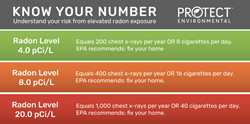
Know your number – learn how radon could impact your health
“Radon in homes is more common than you think. In fact, every state in the U.S. has homes measured with radon levels above the recommended levels,” Deb Brown, chief mission officer for the American Lung Association said.
LOUISVILLE, Ky. (PRWEB)
May 08, 2023
Protect Environmental, in conjunction with the American Lung Association, announced today the national partnership between the two organizations to prevent radon-induced lung cancer. The announcement comes during the kickoff of Lung Cancer Action Week, an initiative focused on raising awareness and building support for improved lung health. Exposure to radon is the leading cause of lung cancer among non-smokers, second only to smoking, and is responsible for more than 21,000 annual deaths in the United States.
“Radon in homes is more common than you think. In fact, every state in the U.S. has homes measured with radon levels above the recommended levels. Since it is odorless, tasteless, and colorless, all indoor spaces should be tested regardless of geographic location and building type,” said Deb Brown, chief mission officer for the American Lung Association. “This is why we are thankful for our partnership with Protect Environmental to help raise awareness about radon and provide testing for more people. Together we hope to reduce the burden of lung cancer caused by radon.”
As part of the national partnership, Protect Environmental will provide its National Radon Risk Search™ tool and offer no-cost professional testing to assist American Lung Association supporters with understanding the radon risk in their communities and homes. The organizations will also partner to amplify national, state, and local policy initiatives that impact lung health, with Protect Environmental pledging more than $100,000 to support these joint efforts.
“The American Lung Association has been a long-time friend of Protect Environmental, and we are excited to be expanding our relationship through this strategic partnership,” said Kyle Hoylman, chief executive officer of Protect Environmental and a member of the American Lung Association’s Local Leadership Board in Kentucky. “Joining forces with the leading lung health advocate in our country will amplify our efforts to increase awareness about the dangers of radon gas exposure, with the ultimate goal of saving lives by preventing radon-induced lung cancer.”
To learn more about the radon risk in your community, use the National Radon Risk Search ™ tool. To better understand the radon risk in your own home, request no-cost professional testing conducted by one of Protect Environmental’s trusted professionals. Learn more about the partnership with the Lung Association at Lung.org/Protect-Environmental.
About Protect Environmental
Protect Environmental is a national leader in the environmental consulting and construction industry, focusing on radon and chemical vapor intrusion management. With a proven track record spanning 18 years and more than 200,000 completed projects in all 50 U.S. states and 2 U.S. territories, the company provides expert service from its trusted professionals to provide peace of mind protection to property owners seeking to build and maintain healthy, safe, and sustainable indoor environments. Join our rapidly expanding team, https://apply today. For more information, call 502-410-5000 or click on https://www.protectenvironmental.com.
About the American Lung Association
The American Lung Association is the leading organization working to save lives by improving lung health and preventing lung disease through education, advocacy and research. The work of the American Lung Association is focused on four strategic imperatives: to defeat lung cancer; to champion clean air for all; to improve the quality of life for those with lung disease and their families; and to create a tobacco-free future. For more information about the American Lung Association, a holder of the coveted 4-star rating from Charity Navigator and a Platinum-Level GuideStar Member, or to support the work it does, call 1-800-LUNGUSA (1-800-586-4872) or visit:Lung.org.
Share article on social media or email:

